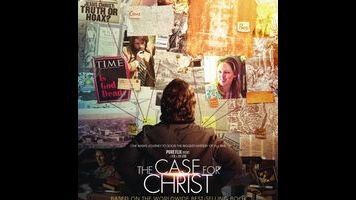From the believers behind God’s Not Dead comes a slightly less preachy Case For Christ
Film Reviews Film
“You’re cheating on me—with Jesus!” exclaims Lee Strobel (Mike Vogel) when wife Leslie (Erika Christensen) shares her newfound faith with him. The Case For Christ adapts Strobel’s book of the same name for Pure Flix’s first real leap into period production (their Columbine film, I’m Not Ashamed, didn’t exactly sweat the set dressing). It’s the early ’80s, and hard-boiled Chicago Tribune reporter Strobel is a firm atheist. His daughter, Alison (Haley Rosenwasser), is saved from choking to death on a gumball by provident stranger/devout nurse Alfie (L. Scott Caldwell), who credits her not going to another restaurant that night to a feeling God gave her that she’d need to be on site. Lee isn’t convinced, but Leslie’s intrigued, and—a few church services later—she’s a full-on Christian convert. That’s too much for Lee, who sets out to disprove the validity of her newfound faith and quickly discovers that letting Bertrand Russell do the argumentative lifting isn’t going to cut it.
Apologists Strobel and Gary Habermas (played here by Kevin Sizemore) appeared as expert witnesses in God’s Not Dead 2, defending the Lord in court; their dramatization here is the next step in the possible establishment of a Pure Flix Connected Universe. Strobel’s “investigation” drew upon testimony from doctors, psychologists et al., each of whom ostensibly help to build up the empirical evidence for Jesus’ crucifixion, death, and resurrection. Whether the case is convincing is beyond this review’s purview, but The Case For Christ is easily Pure Flix’s most superficially credible production to date. Looking like a cut-rate Billy Crudup, Vogel leads a cast of professional thespians, including Robert Forster and Faye Dunaway (one scene apiece, the latter also listed as an associate producer); no underperforming devout players like Kevin Sorbo or Dean Cain let down the team.
The Case For Christ is anomalous for Pure Flix in several other respects. It features what’s almost certainly the first non-Christian song cue in its oeuvre (even if the message sent by dropping “Carry On My Wayward Son” is loud and clear) and the period dressing, while restricted to easily controlled, mostly sparsely dressed sets, is basically on point. (Before he accepts Jesus—a foregone conclusion—Lee drinks a lot of Schlitz, alongside a smattering of Heinekens; no reason sin can’t rack up some product placement points along the way.) More surprisingly, no Christians express the persecution complex so endemic to these films, nor are atheists demonized—one of Lee’s friends remains unconverted by the end, though not before “admitting” that believing or refusing to believe are both leaps of faith.
There are a few dog whistles to the conservative base—like a periodizing clip of Ayatollah Khomeini, to remind the audience of the Islamic Threat—but far fewer than usual. More insidious are Leslie’s and Lee’s paths to faith, both of which are enabled by very patient black people. For Leslie, that’s Alfie, who takes her to church and nods sagely while listening, occasionally checking to make sure Leslie is reacting correctly. For Lee, it’s James Dixon (Renell Gibbs), a young black man unjustly accused of a shooting. Erroneous reporting following the lead of the corrupt Chicago police department lands Dixon in jail, and it’s not until Strobel digs deeper that he exonerates Dixon, but not before the latter is convicted, incarcerated, and badly wounded in a prison fight. “I didn’t see it,” Strobel apologizes, when explaining how he was so misled. “You didn’t want to see it,” says Dixon, establishing a parallel to atheists who just won’t accept the obvious. Through Dixon’s suffering, Lee is led to the truth.
The Case For Christ is pretty slow going, tedious rather than offensive, with Strobel repeatedly whiteboarding out the evidence as callback voice-overs add up all the pieces until he’s convinced. “All right, God,” he finally says. “You win.” Despite the relative mildness, this is finally a fairly familiar Pure Flix story about an atheist whose hatred for Christianity (“You people and your God!”) is probably rooted in something other than rationality; Dunaway’s psychologist explains that the “father wound” caused by absent dads can, implicitly, lead to rejection of one’s Heavenly Father—a common line of evangelical argument. Strobel is finally overwhelmed into accepting the target audience’s beliefs. These, granted, are kept deliberately limited, with no mention here of Strobel’s stance on abortion or gay marriage. (Take a guess, though.) But strategic omission doesn’t make this all that different a pure flick, or one more likely to win over the unconverted.